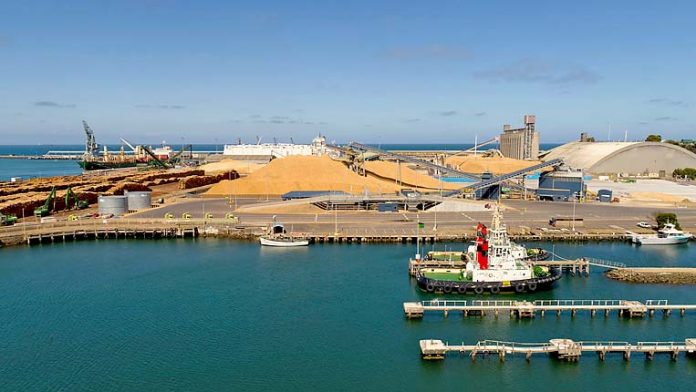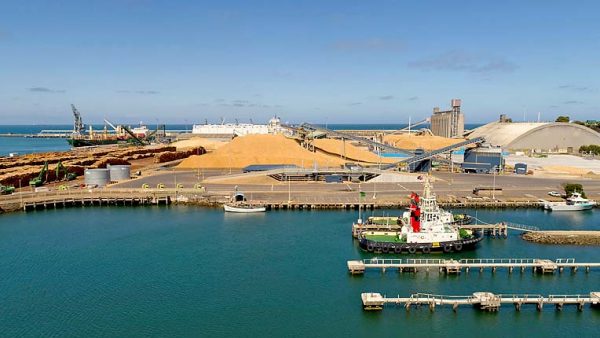

SPECIAL REPORT
THE regional timber workers’ union has raised concerns regional log exports from the Port of Portland may slow in coming weeks as the coronavirus outbreak triggers a lockdown at some Chinese ports.
Speculation has emerged log ship movements will continue at Port of Portland until February 20, but “nothing is guaranteed” after this date.
The union has also raised safety concerns regarding workers in the marshalling yards who are boarding woodfibre ships from China given the possibility of contracting the deadly coronavirus.
According to sources within the industry, some harvesting and haulage companies have started to “lay off, redeploy and send workers on leave” due to the looming situation.
The Border Watch understands at least one major harvesting company held talks with staff earlier this week on the issue.
The news comes as the region’s $300m rock lobster export sector has been crippled by the global health crisis.
The situation is expected to become clearer next week when the extended Lunar New Year public holiday ends and sawmills in China restart.
These trade implications have already triggered a shutdown of sections of New Zealand’s harvesting sector.
Green Triangle union official Brad Coates said yesterday the regional forestry export industry faced uncertain times as the coronavirus devastated export markets across the globe.
With speculation emerging in recent days, he said it appeared log ship movements were continuing at the Port of Portland but this may change in weeks.
He warned any lengthy disruption to log exports would deliver a “massive hit” to the regional sector given China was the region’s largest log export destination.
“We are also fairly concerned about the safety of workers going on Chinese ships. We do not know what quarantine safety measures have been put in place,” Mr Coates said yesterday.
While the export woodchip movements appeared “fluid”, Mr Coates said a log ship was expected at Portland on later this month and it was unsure what would happen after that.
“We are not really sure what is happening – it is up in the air,” said the Construction Forestry Maritime, Mining and Energy Union Green Triangle manufacturing section secretary, pictured right.
“Major manufacturing regions in China are being quarantined and shut down.”
Mr Coates called for regional harvesting/haulage companies to be upfront with employees over the situation.
“We know there have been a number of meetings and some companies have not been very forthcoming,” he said.
He said employees needed to know given they have financial commitments.
Mr Coates also questioned what contingency plans the Federal Government had in place to help export industries impacted by the current health crisis and the looming loss of jobs and economic activity.
While the regional forestry could ride out an export lock-down for three to four weeks, he warned any long term fall-out could have significant impact.
He warned the impact would also flow to regional businesses that were underpinned by
the forestry sector
“The only thing that will mitigate this slightly is additional haulage and salvaging operations needed in bushfire zones,” Mr Coates said.
It is understood the region’s harvesting/haulage sector directly employs around 1500 people.
Mr Coates said the issue would also have a significant impact on the Port of Portland, which was the largest log and woodfibre export facility in Australia.
The Border Watch contacted a number of forestry companies for comment.
Port of Portland closely watches unfolding situation
THE Port of Portland management says it is “watching and monitoring” the fallout from the coronavirus on its export facility and has implemented measures to mitigate health risks associated with Chinese ships.
Port of Portland chief executive officer Greg Tremewen said Chinese log ships were continuing to flow and out of the port without disruption.
“There have been no issues,” Mr Tremewen told The Border Watch yesterday.
Asked if there could be disruptions to shipping movements in coming weeks, he said these questions should be redirected to the log exporters.
But he said the port’s management had been on the front foot in protecting workers at the facility and the wider community by implementing prevention
measures.
Mr Tremewen said Chinese ships had to sign a health certificate declaring everyone on board was well before entering the port.
“These Chinese ships have a 16 to 18 day transit time,” he revealed.
Mr Tremewen said this was greater than the 14 day quarantine period being implemented by authorities
State forestry leader says uncertainty will continue
A STATE forest products industry leader says the current uncertainty around the possible impacts of the coronavirus on wood fibre exports from the Port of Portland to China was likely to continue.
Australian Forest Products Association SA branch manager Leon Rademeyer, pictured right, said this uncertainty would plague the sector while the international community battled to contain its spread.”
A processing slowdown at Chinese ports and elsewhere in that country – due in part to an extended Chinese New Year – is causing uncertainty in international and in turn domestic markets,” Mr Rademeyer said.
“However, inaccessible Chinese markets are bound to have negative economic consequences
throughout the forest industries value chain, as China is a pivotal export destination for our regional timber industry in both finished goods and surplus forest fibre.
“Like other primary industries many rural and regional jobs are linked to export markets and it is often the case that local communities are the first to feel the effects of export market fluctuations.”
Coronavirus will potentially strike a devastating blow
MEMBER for Barker Tony Pasin says the coronavirus will potentially strike a devastating blow to Australia’s tourism and trade sector.
“First and foremost we are concerned with the health and safety of the Australian people … and the Australian Government is working across agencies to implement additional measures to manage risk,” Mr Pasin said.
“From a tourism and trade perspective this is a potentially devastating blow, especially to our tourism industry which was already grappling with the aftermath of the bushfires.”
Regarding trade and log exports particularly, he said regional processors had the capacity to take additional resource.
“Indeed, for a long time they have been crying out for increased log supply to fill orders domestically,” the Liberal backbencher said.
“As the nation recovers and rebuilds following the fires products like fence posts and structural timber for housing will be in high demand.”
He said the forestry sector was “grappling” with a range of issues in the aftermath of bushfires.
“I have been in Canberra this week meeting with leaders in the forestry industry to talk through these issues,” Mr Pasin said.







